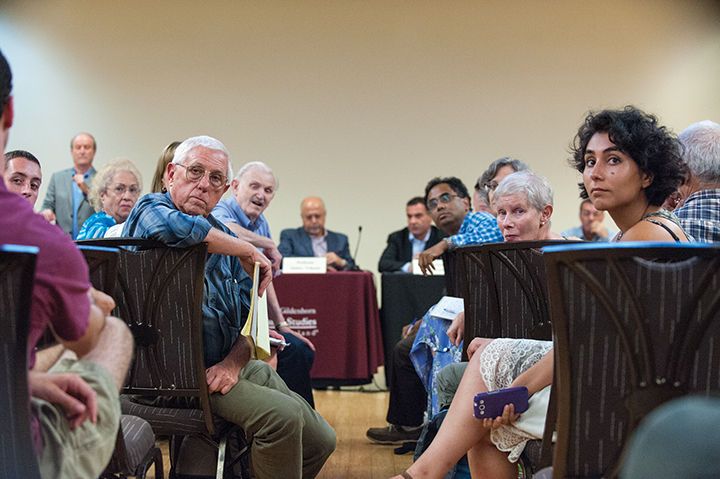
The crowd turns to listen to the viewpoint and questions of a person in the back at the Open Forum on the War in Gaza on September 3, 2014 in the Atrium of Stamp.
Tensions were high at Wednesday’s forum on the war in Gaza when experts on both sides of the conflict weighed in but were soon overshadowed by passionate students with direct ties to the war.
The crowd of roughly 150 people was composed almost equally of students and adults in the Atrium in Stamp Student Union. The discussion began with an overview of the facts of the war and historical context by moderator and panelist Yoram Peri, director of the university’s Gildenhorn Institute for Israel Studies and former advisor to Israeli Prime Minister Yitzhak Rabin.
The panel of experts at the open forum consisted of Shibley Telhami, an Anwar Sadat Professor for Peace and Development; Ariel Bendor, an expert on law and war on terrorism and a distinguished visiting scholar at GIIS; Shlomi Eldar, an Israeli journalist and expert on Hamas; and Khaled Elgindy, a former advisor to the Palestinian Authority and fellow at the Brookings Institution in Washington.
The recent war in Gaza lasted 50 days and has been in ceasefire for about a week. It is one of several wars between Israelis and Palestinians in recent years but Peri said it has been “one of the most terrible,” acknowledging that although the Palestinians suffered significant civilian casualties, Israel also sustained losses.
The discussion went from calm evaluation to heated debate when Elgindy voiced his perspective on Hamas, receiving sharp criticism from the audience. He compared Hamas, which is designated a terrorist organization by the United States, European Union, Canada and Australia, to Fatah, the party who previously ruled Gaza, as well as the Israeli government.
“I would actually submit that Hamas is not all that different from Fatah in both politics and in terms of its actual immediate political objectives,” Elgindy said. “Hamas is a political body, yes it’s true it is ideological, religious, but that’s also true of political actors in Israel who are in government. There are religious nationalists that are part of the cabinet. I would argue that Hamas is no more or no less extreme than many of those in Israel’s government.”
Tamar Adhanan, a junior economics major, reacted sharply to Elgindy’s statement.
“What would you do as a leader of a democratic country that’s getting attacked with rockets already?” Adhanan said. “I’m from Israel and my sisters and mother spent all summer hiding from rockets and getting attacked.”
Adhanan moved to the United States five years ago after serving in the Israel Defense Force. She worked at the Israeli Embassy in Washington before coming to study at this university.
“It is very easy to sit down at a table and say Israel is doing this and the Israeli military is wrong,” she said. “Yes there are casualties, but we use our best equipment and best technologies to target only Hamas people or people that are involved.”
After further criticism of Hamas’ tactics, such as firing rockets from heavily populated areas, possibly using civilians as human shields and spending infrastructure money on tunnels into Israel, senior supply chain management major Manar Dajani stood up and spoke about her family in Palestine.
“I had three cousins of mine who died recently in this war; they were not used as human shields,” she said. “There was no Hamas rockets fired anywhere near them; there was no Hamas weapons hidden in the houses of my cousins who were disrupted. I have a cousin who is in critical condition and cannot get the medical attention that she needs. If they want to help civilians used as human shields, why don’t they allow them to get medical treatment?”
Two professors in the audience tried to quell the tensions and find middle ground, receiving exuberant applause from the audience.
“There is enough about war that we know so we don’t have to pick sides to say where are human rights violated. War violates human rights on all sides by all militaries,” said Joe Oppenheimer, a government and politics professor and Vietnam War veteran.
Edy Kaufman, a government and politics professor who recently taught a summer course on the Israeli/Palestinian conflict, voiced his concern for the level of debate in the forum.
“When I look at the audience and even our experts, I come out with a feeling that we’re more adversarial in the way we communicate and I’m very sad for that,” Kaufman said. “Because you would expect countries after a war to say that this is a time for reflection, how to do things better.”



